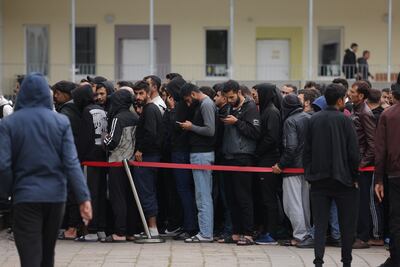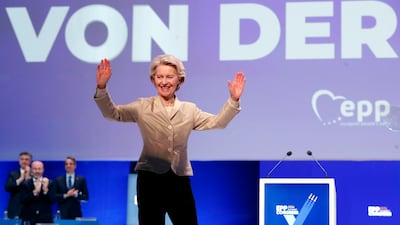Europe's conservatives backed Ursula von der Leyen for a second term as head of the EU's executive on Thursday, sending her into battle with a pledge to get tough on illegal migration.
A congress in Bucharest formally crowned Ms von der Leyen as lead candidate of the European People's Party for EU-wide elections in June.
Ms von der Leyen, 65, is running on a platform of defending Europe's values and security after a turbulent first term as President of the European Commission.
The next five-year term could prove similarly challenging as the war in Ukraine drags on, climate deadlines draw nearer, the far-right jostles for power and Donald Trump plots his comeback in the US.
"This is what we are standing for: democracy, prosperity, security. We cannot have one without the others," Ms von der Leyen told delegates in Bucharest, where a 400-89 ballot confirmed her nomination.
Centre-right leaders from across Europe threw their support behind Ms von der Leyen, a former German defence minister who was a surprise choice to lead the commission in 2019.
A 25-page manifesto for the broad centre-right alliance promises to support Ukraine, ramp up Europe's arms production and step up the fight against terrorism and organised crime.
In an eye-catching migration pledge, it proposes a "fundamental change in European asylum law" in which claims could be processed in third countries.
A scheme similar to Britain's Rwanda deportation plan would be legal because there is no "right to freely choose the country of protection", the manifesto says.

The manifesto also calls for EU border agency Frontex to treble its manpower and for all migration to the EU to be "comprehensively electronically monitored".
"It is us, the Europeans, who decide who comes to Europe and under what circumstances, and not the organised crime of smugglers and traffickers," Ms von der Leyen said.
Austrian Chancellor Karl Nehammer, one of the leaders speaking in Bucharest, backed the call for asylum procedures in "safe third countries".
"We must ensure that those who cannot stay in the union are removed," he said.
The party is calling for a more muscular European foreign policy in which sanctions could be passed over the veto of individual members such as Hungary.
It hopes to bring the UK, which left the EU in 2020, into a new "European Security Council" and draw a up a long-term strategy for the Middle East.
Ms von der Leyen is treading a careful line in climate policy by touting her sprawling Green Deal package while assuring the right she prefers "positive incentives" to regulation.
Her party also wants a "digital awakening" that makes the EU a force to be reckoned with in artificial intelligence, alongside the US and China.
With Donald Trump gaining momentum in his bid to return to the White House, Ms von der Leyen is siding with calls for Europe to take more responsibility for its own defence.

The aim is to modernise armed forces that fell into disrepair after the end of the Cold War, with Ms von der Leyen taking some of the blame for that given her tenure at the German defence ministry.
"Europe must spend more, Europe must spend better and Europe must spend European," she said on Thursday.
The Party of European Socialists, representing the broad centre-left, has chosen Luxembourg’s Nicolas Schmit as its lead candidate for the election, which takes place between June 6 and 9.
Polls show the EPP in the lead.
Although voters are electing the European Parliament, not the commission directly, the idea behind choosing a lead candidate is that whichever bloc wins would put that person forward as president.
However, that system was put aside in 2019 when none of the lead candidates proved acceptable to European leaders and Ms von der Leyen was parachuted in as a compromise.
Her own German government abstained on her nomination after some members of the coalition criticised her performance as defence minister.
The daughter of early Brussels official and West German politician Ernst Albrecht, Ms von der Leyen is the first female head of the commission.
A trained gynaecologist and mother of seven, she held several posts in Angela Merkel's government in Germany before transferring to Brussels.
She had been linked with a switch to Nato's top job but instead chose to seek a second term at the helm of the EU. Dutch Prime Minister Mark Rutte is considered the favourite for the Nato role.


